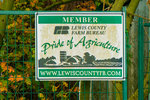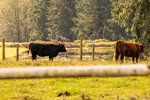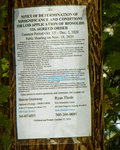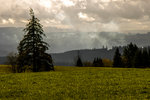



Members of the public are invited to comment on Onalaska company Fire Mountain Farms’ proposal to apply biosolids at five Lewis County locations from now until Dec. 2.
Biosolids — treated sewage from wastewater treatment facilities — are often applied to crops as a fertilizer similar to cow manure. The refined material, which the state Department of Ecology regulates, is used across the state to facilitate the growth of wheat, corn, grass, hay and even hops, according to Ecology regional spokesperson Jeff Zenk.
“All of Washington residents create biosolids when we’re flushing our toilets or bathing or otherwise using water around our houses,” Zenk said.
But biosolids have drawn their fair share of criticism in the past, and Fire Mountain Farms vice president of operations Ryan Thode said opposition is already brewing from Lewis County residents who say the “sewage sludge” could contaminate neighboring land.
“We expect to see some concern from the community anytime we permit ground for biosolids,” Thode said.
Some businesses have taken a stand against biosolids too, including PCC and Whole Foods. The USDA also disqualifies organic produce if biosolids are used during production.
“A lot of that goes back to fear-based marketing,” Thode said, citing strict regulations by Ecology.
Besides using the reclaimed material for agriculture, it can also be incinerated or simply buried in a landfill — but those options are more expensive, and can leave taxpayers on the hook for increased sewer or septic pumping costs, Zenk said. The way Ecology sees it, recycling the material can be a win-win.
But the terminology has been at the center of the controversy, evident in the onslaught of comments and witty headlines using “biosolid” as a fill-in for the less-than-kid friendly “s-word.”
“Just to reinforce this about biosolids,” Zenk said. “It’s not poop.”
After the rise of biosolid use in the 1980s, a Seattle-area “Sludge Manager” led a successful nation-wide effort to largely replace the term “sewer sludge” with the word “biosolid,” according to King County’s Department of Natural Resources.
Back in 2017, Fire Mountain Farms saw pushback when applying to use biosolids in Lincoln County. Eventually, the company was approved to apply the material to just a fraction of the acreage they applied for, but not before residents raised concerns about toxins being carried to neighboring land by floods or high winds.
The biosolids Fire Mountain Farms is proposing to use — Class B biosolids — could still contain pathogens. But Ecology has issued a determination of nonsignificance under the State Environmental Policy Act, and would impose conditions on the company’s use of the material. For example, storage of the material would be limited to six weeks, Ecology would investigate odor complaints, annual soil sampling would be conducted, and the company would have to prove adequate distance between biosolids and wells.
The controversy around Fire Mountain Farm’s applications isn’t alleviated by the company’s past, either. In 2015, they were entangled in a legal battle after it was discovered they were accepting waste classified as hazardous from Emerald Kalama Chemical and mixing it with biosolids for nearly 20 years. Although it was ultimately concluded that the waste did not pose a threat to human health, Ecology maintained that regulations were violated.
Since then, Fire Mountain Farms has been working with Ecology to get back in compliance.
A virtual hearing for public comment is set for Nov. 18. Comments can also be submitted online at http://swm.ecology.commentinput.com/?id=DQCfZ.